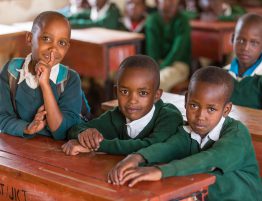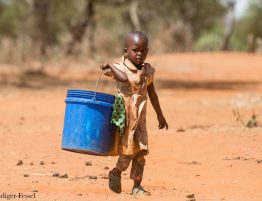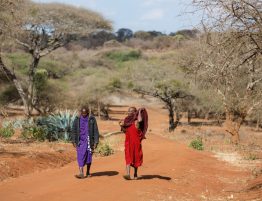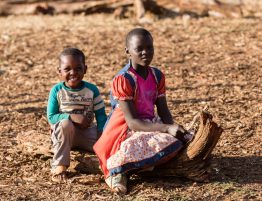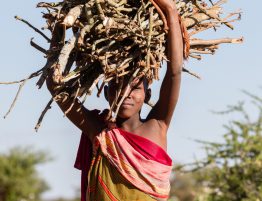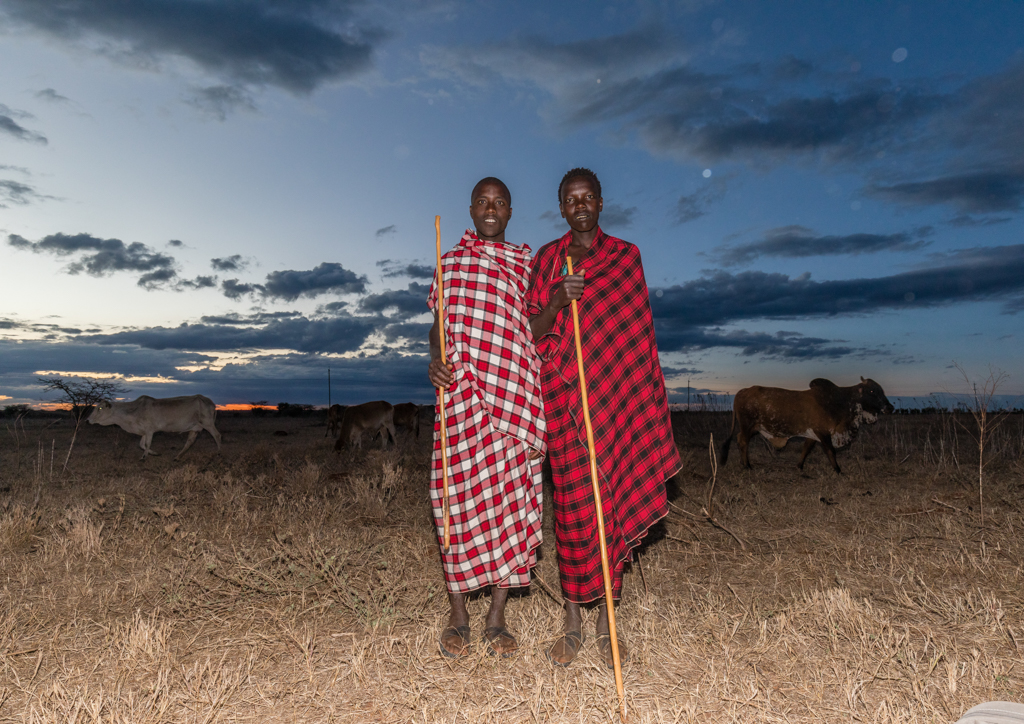
WHO is upendo, HOW does it work and WHAT does upendo do?
upendo is an organization for the promotion of development cooperation at the municipal level in Africa, mainly in Tanzania. Project work is planned and implemented in close cooperation and coordination with representatives of the population and the government, which is ultimately responsible for the country and its people. Only locals work on project sites. In our two partner organisations ECLAT and PAMS, all project leaders are skilled locals who want to empower their people to escape poverty and backwardness and shape to shape themselves their own cultural progress. Well acquainted with the culture of their people they can initiate fundamental changes and impart these in such a way that they will be accepted
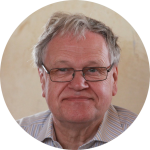 Gründer des Vereins ist Dr. Fred Heimbach. Dem Vorstand gehören ferner Alexander Nikolakis und Joachim Buchmüller an.
Gründer des Vereins ist Dr. Fred Heimbach. Dem Vorstand gehören ferner Alexander Nikolakis und Joachim Buchmüller an.
A successful year: completion of two major projects
Despite the Corona pandemic 2021 was once again a successful year for us. Our partner, the ECLAT Foundation, was able to continue all projects under the leadership of Toima Kiroya and after a lapse of 1½ years we were able to return to Tanzania again to visit the ongoing projects and plan new ones. Thus, we were able to officially hand over a whole series of school projects in different areas of the country. These include two of our most important projects: the secondary school in Emboreet and the second stage of the extension of the Vocational Training Center. It is great to see that the number of students at both schools has continued to increase in 2021; however, this success is also a challenge for us to stay committed. The work with the women’s empowerment groups continued much as usual – more in the background and perhaps less spectacular, but at least as important. ECLAT was also able to build two new plants to produce clean drinking water through PAULA water filtration. And the projects with the PAMS Foundation at the elephant corridor and some secondary schools also continued as in previous years.
Outlook
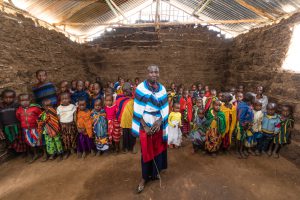
Wir möchten, dass diese Kinder in eine richtige Schule umziehen können
The handling of the many construction projects, especially the two large projects, is a great challenge for our partners in Tanzania. According to German standard we request a high standard of accounting and administration quite different from what is customary in Tanzania. We have jointly decided to take a step back for the time being in order to give ECLAT some time for consolidation. In addition, ECLAT would like to carry out more capacity building projects: alongside the women’s work for cultural and economic development a campaign to raise awareness about the need for family planning in order to limit population growth, and after completion of their training in the district the structured accompaniment of the vocational students who start their own business. The budget for ECLAT will therefore be lower in 2022, but ECLAT will be more involved in building and strengthening the knowledge and skills of the population.
Where does upendo work?
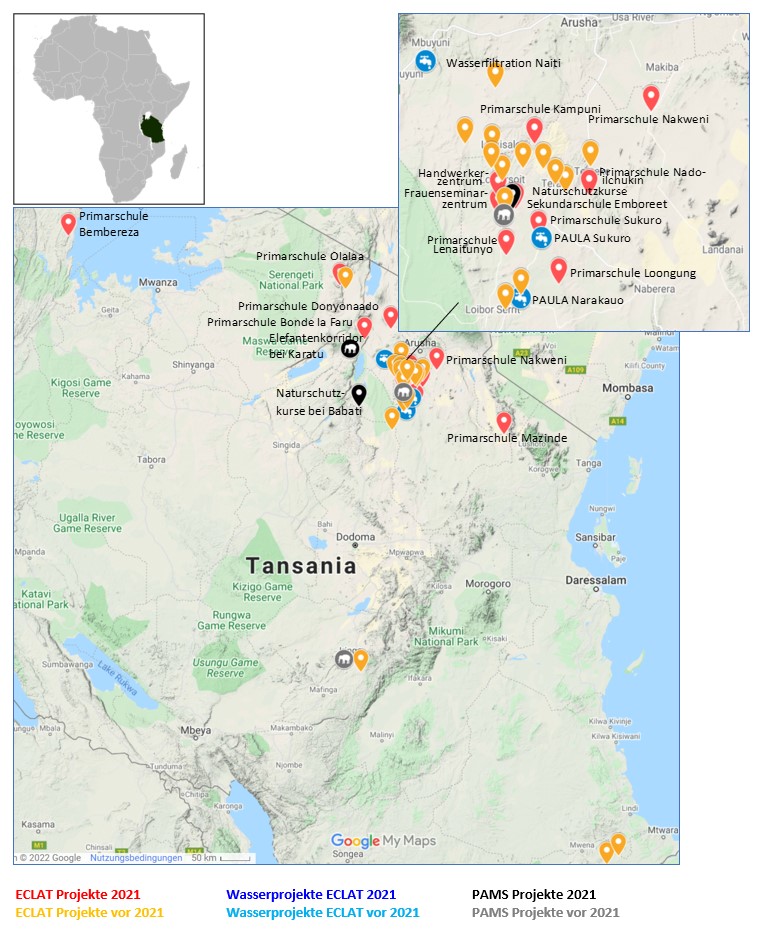
Tanzania’s school system and our commitment to primary schools
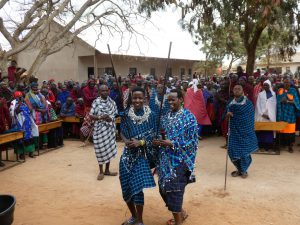
Traditionelle Tänze bei der Übergabefeier der Primarschule in Sukuro
The school system in Tanzania is influenced by the British school system of the colonial era. The primary school consists of seven grades. Those who pass the final examinations qualify for secondary school. This lasts four years and leads to the “ordinary level”, which is roughly equivalent to the German “Realschulabschluss”. Those who do well at this level are allowed to attend the last two years of secondary school up to the “advanced level”, which corresponds to the German “Abitur”.
Tanzania has more than 17,000 public primary schools and about 6,000 secondary schools, but the state does not have the financial means to keep all these schools in good shape and to expand and run them according to demand. Officially, there should be no more than 45 children in a class in the country’s primary schools, and the limit is 40 in secondary schools. However, the situation is often quite different, especially in the remote areas where upendo is engaged. The high number of children, the government’s pressure on parents to actually send their children to school, teacher shortages and the increasing awareness of the importance of school education among the population have caused the number of children in the schools in our outreach areas to rise sharply. Unfortunately, 100 children in one classroom are no longer a rare occurrence here. Since most parents in our areas of operation are illiterate, they cannot support their children’s schooling – and the children struggle and often do not do so well in school.
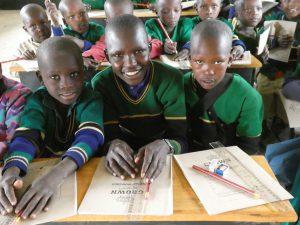
Die Kinder an der Primarschule in Engorika erhielten auch Schreibmaterial
In 2021, thanks to the support of Fly&Help and Entrepreneurs for Knowledge, upendo and ECLAT were able to expand a total of nine primary schools: in Bembereza (Muleba District), Bonde la Faru (Karatu), Engorika (Monduli), Kampuni (Simanjiro), Lenaitunyo (Simanjiro), Mazinde (Simanjiro), Nado-ilchukin (Simanjiro), Nakweni (Simanjiro) and Olalaa (Ngorongoro). All projects have already been handed over to the Tanzanian state as the operator of the schools, only the school in Bembereza is run by a Tanzanian NGO.
Completion of the secondary school in Emboreet
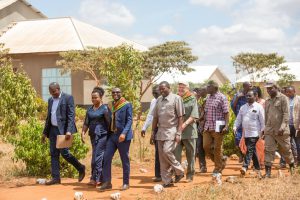
Mit dem District Commissioner voran werden die Gebäude inspiziert
In 2014 the construction of the secondary school in Emboreet was our first project. Thanks to the support of the Foundation for Care and Education, we have been able to continuously expand the school over the past eight years. It Is the only secondary school in the district, that offers education up to A-level (Abitur). The number of pupils has now risen to over 800. The school is well equipped with science classrooms, a library, a computer centre, classrooms, dormitories, a large multi-purpose hall, houses for teachers, a borehole with a solar water pump, solar energy supply, toilets and washrooms as well as a fence to provide protection from wild animals. No doubt this infrastructure is one of the reasons why the students’ final exams are now turning out well. Some of the former pupils are already studying at universities in the country. The government has also contributed to the expansion of the school by building more classrooms, toilets and a building with offices.
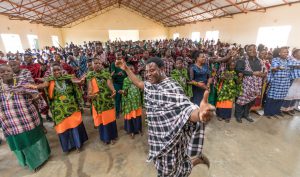
Höhepunkt der Übergabefeier war ohne Zweifel der Chorauftritt
The handover ceremony took place on 3rd December 2021. The guest of honour was the District Commissioner Dr. Suleiman Serera. We experienced a lively and long celebration together with numerous representatives from the local and district government, many residents of the surrounding villages and of course the students. In their songs, they thanked the school for the good facilities and the opportunity to go to school there. The two choirs from the surrounding villages also expressed their gratitude for the fact that the secondary school makes it possible for the children of their communities to receive an advanced education – something that seemed unthinkable just a few years ago.
Computers for the secondary school in Terrat
Thanks to Entrepreneurs for Knowledge, we were also able to set up a computer room with 15 computers at the secondary school in Terrat (Simanjiro), so that the pupils there also learn to use them and catch up with international standards. Their enthusiasm was great at the handover on 1st August 2021 – and expectations were high!
Second stage of expansion of the Vocational Training Center
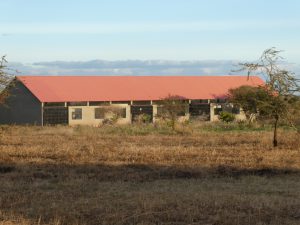
Die neue Werkstatthalle
At the end of July, after two years of training, the first young men and women were able to complete their training as bricklayers at the Vocational Training Centre. They ceremoniously received their certificates. The best of them received a basic set of tools to start their professional independence. At the same time, the training of the first carpenter and locksmith apprentices, girls and boys from the Simanjrio district, started.
Thanks to the financial support of the Federal Ministry for Economic Cooperation and Development and DER Touristik on 26 November 2021, upendo handed over the second stage of the Vocational Training Centre to VETA, the state agency for the training of craftsmen, which also runs the centre.
Until now, young people in the district who could not qualify for an academic education at school have had no chance to learn a trade. Now, however, they can learn something instead of migrating to the big cities or going back to their villages to herd cattle, sheep and goats like their ancestors and start families at a very early age.
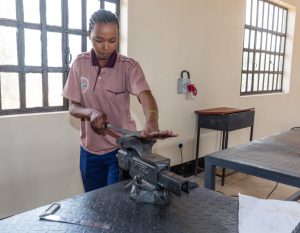
Auch Mädchen lernen nun das Schlosserhandwerk
The two workshops built in the past two years are particularly impressive – they are also of central importance for vocational training in Tanzania and have been adequately equipped and fitted out. But the classrooms, the multi-purpose dining hall, the toilets and washing facilities and the dormitory also look impressive. VETA contributed with financing the construction of houses for the instructors and the dormitory for girls. The centre is connected to the public electricity grid so that also machines can be used for which solar power is not sufficient.
The guest of honour at this event was Makon-goro Nyerere, Regional Commissioner of Man-yara and son of the state founder Julius Nyerere. Representatives of VETA both from the district and the region but also from the headquarters in Dodoma and Dar es Salaam, but especially the chairman of the VETA National Board, Peter Maduki, thanked upendo and ECLAT for the construction of the centre.
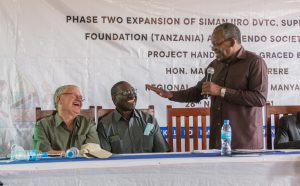
Der Regional Commissioner liebte Scherze während der Übergabefeier
Seminar centre for women’s work
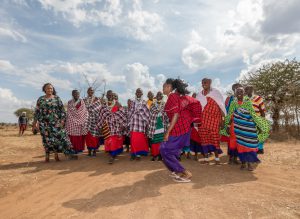
Lebendiges Treffen einer Frauengruppe
Our partner organisation ECLAT has been trying to strengthen the role of women in the Maasai culture for many years. Philomena Kiroya, herself a Maasai, founded and leads this work. ECLAT runs more than 70 women’s groups in the villages of the district. The groups are regularly visited in their villages to exchange experiences and to discuss problems. Almost all of the groups have by now received a micro-credit with which they can learn to run their own businesses. Many find it difficult to suddenly have money of their own and to use it successfully. Some have economic success, others hardly any.
For more than four years now, one of the women’s groups has been meeting every week at ECLAT’s seminar centre for women’s work to receive intensive training from the teachers and to reflect together on the group and its success or failure. This is no easy task either, considering that hardly any of the women have ever sat on a school bench to learn reading and arithmetic.
The impact of ECLAT’s women’s work is now clearly noticeable. At first, it was a taboo for the women to meet at all. Then, all of a sudden, the women had their own money in their hands – something that until then had only belonged to men. Today, the women meet each other without any worries and appear confident and sure of themselves, even when Europeans come to visit. Some of them have achieved solid economic success so that they can take care of themselves and their children on their own. Such developments are slower than building classrooms or workshops, but they are at least as important for the development of the Maasai.
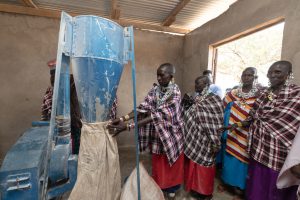
Diese Frauengruppe wirtschaftet erfolgreich mit ihrer Maismühle
Catherine Maguzu has been working in ECLAT’s women’s work for two years. She is a well-trained social scientist and experienced in women’s work and lives in Arusha. Even though she herself is not Maasai she is appreciated as a counsellor. The developments in women’s work need continuous adjustments, which need to be carefully analysed and considered – ideally by an experienced professional who monitors and accompanies the work from outside.
Projects in the conflict area between man and nature
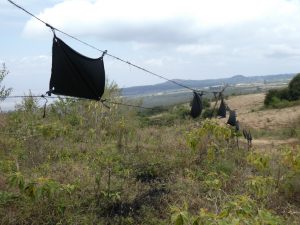
Ein „Zaun“ mit in Chili-Sud getauchten Tüchern hält Elefanten fern
Tanzania is famous for its national parks; after all, about one third of the country’s area is protected. However, the conflicts between man and nature are fundamental in the area of the parks. Since the wild animals living in the parks threaten the
livelihoods of the neighbouring population and the grasslands of the parks are not available as grazing areas for the animal herds of the Maasai, the people are hardly willing to share the idea of animal and nature conservation. Thanks to DER Touristik, we are working with PAMS to ensure that wildlife and national parks are protected, but also that people can live safely near the parks.
The project to protect the elephant corridor in the Ngorongoro Crater was continued by PAMS last year. The elephants in the crater migrate along centuries-old routes from the crater to other national parks. However, due to the strong growth of the Tanzanian population, more and more people are looking for opportunities to plant new fields. Elephants now like to forage in fields that are ripe for harvesting, which can lead to people going hungry. A protective fence along the corridor now keeps the elephants in the corridor. The “fence” is made of cloths dipped in chilli broth. Elephants’ sense of smell is highly sensitive; the animals stay away from the fence and do not ravage the fields nor enter the villages. In this way, the farmers learn to protect themselves and their fields and to live with the wild animals. Only then are they prepared to accept the idea of a national park and the protection of wild animals.
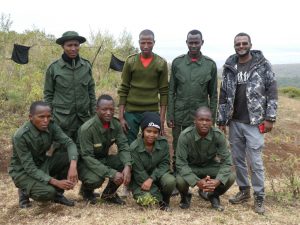
Ranger-Truppe von PAMS im Elefantenkorridor am Ngorongoro-Krater
upendo also supports PAMS environmental education at 10 secondary schools east and west of the adjacent Tarangire National Park. There, pupils are offered participation in a “club” on a voluntary basis, which is very popular with the pupils. They learn the meaning of nature and animal conservation, planting trees, and they visit the adjacent national parks. In the process, they learn to understand the most important environmental problems of their region. It is a pleasure to see how clearly the pupils can identify and discuss the environmental and conservation problems of their country.
Waterprojects
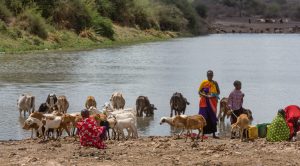
Mensch und Vieh holen sich ihr Trinkwasser im Stausee
Clean drinking water is rare in the Simanjiro district. Either one has access to borehole groundwater (which, however, also means that the water has to be pumped up with a lot of energy from a depth of about 100 meters), or one is dependent on water from a reservoir after the rainy season. There are no streams or rivers in the dry season, which lasts seven to eight months. However, the water from the reservoirs is polluted and contaminated with germs, because the large herds of animals go to the lake to drink, just like the wild animals living here. Accordingly, the statistics of the health stations show many cases of diarrhoea and diarrhoea-related illnesses.
Since 2017, the people in Sukuro have been receiving clean drinking water, which is taken from the reservoir near the village and filtered through membranes in the PAULA container. They have now become accustomed to having to pay a small amount for clean water.
In neighbouring Narakauo, ECLAT built another such plant last year in cooperation with PAULA Water Ltd. This plant is also powered by solar cells and batteries, so that water from the lake is first pumped into the plant and then through special membranes. The villagers fetch the filtered, clean water from the storage tank outside the plant. The village water committee is responsible for the reliable operation of the plant. The money collected is used to pay the staff and to buy spare parts and consumables – a learning process for the village. ECLAT only needs to “look after things” from time to time or look for solutions to major technical problems.
In the neighbouring Monduli district, ECLAT was able to build another such facility last year at the reservoir near Naiti – thanks to the Foundation for Care and Education and in cooperation with PAULA. When this plant was built, great importance was attached to using technology that was adapted to local standards as far as possible, so that in future only the membranes would have to come from Germany. Here, too, the population now benefits from clean drinking water.
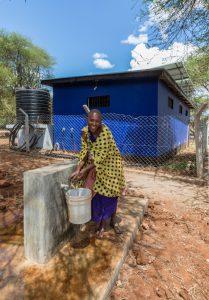
Die neue PAULA Wasserfiltrationsanlage in Narakauo
upendo Income in 2021
upendo thanks all those who support our work in whatever way they can, also on behalf of the communities that are affected in Tanzania. Special thanks for the support given pursuant to the 2021 treasurer’s report go to the Friendship Circle and the following organisations:
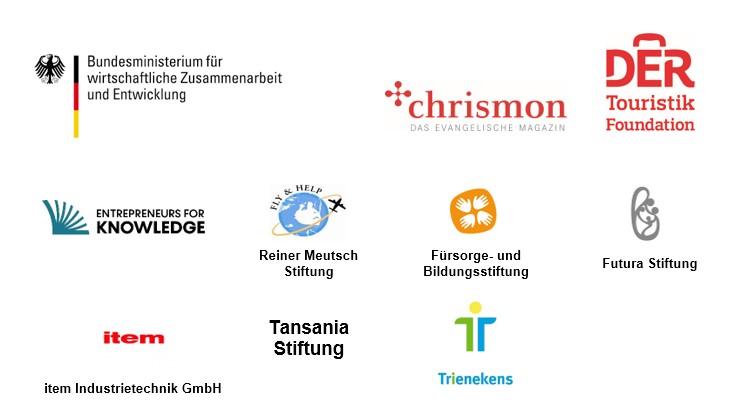
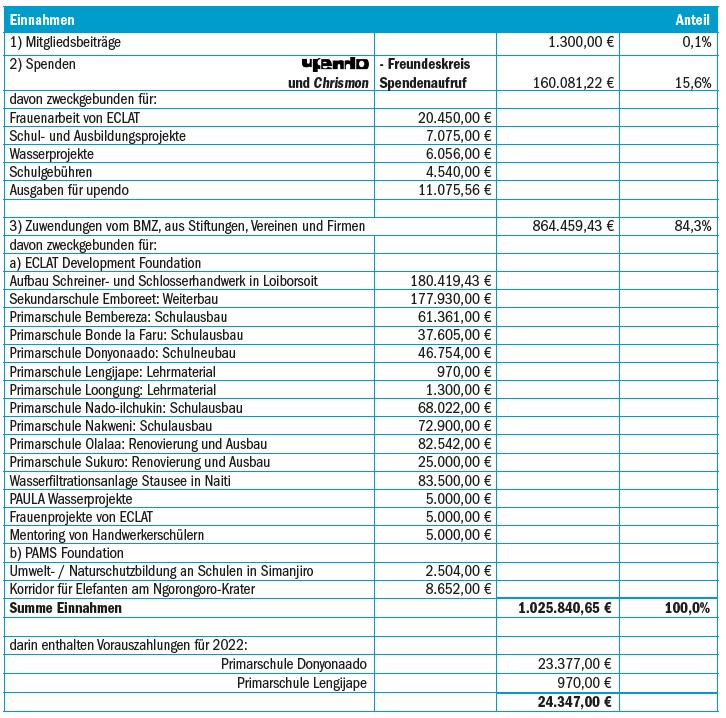
upendo Expenditure in 2021
upendo had the following expenses for the realisation of the projects in Tanzania according to the treasurer’s report 2021:
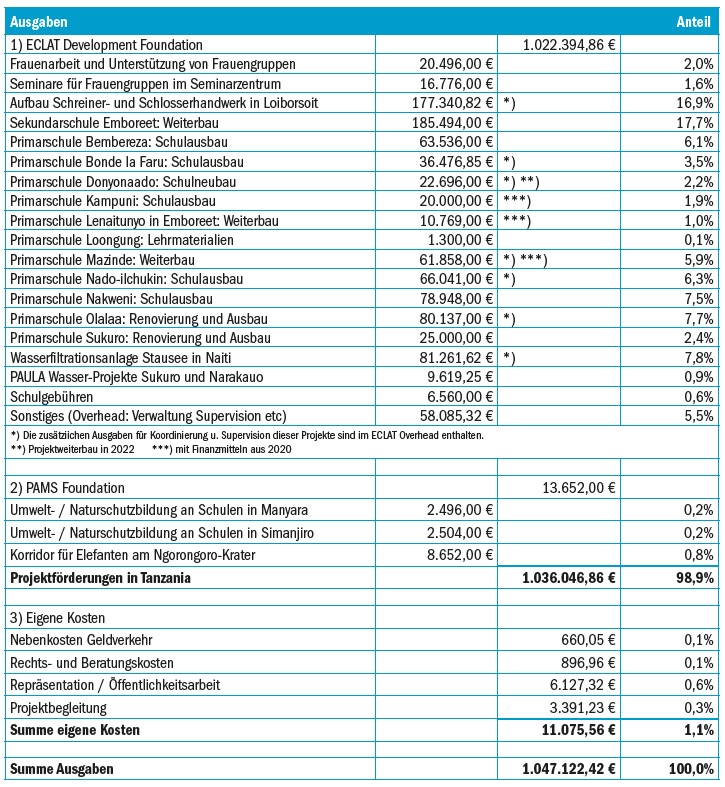
Transparency is a key issue for . Our annual treasury reports are subject to an external audit by the independent external tax consultancy JC Junga Consulting Ltd. in Solingen, Germany. The records on which the 2021 treasury report is based were also examined by this tax consulting firm and checked for compliance. In a letter dated 7 February 2022, the tax consultancy JC Junga Consulting Ltd. certified the accuracy of the treasury report for 2021, which has been published here on our website together with details of the treasury balance for the beginning and end of 2021 respectively.

Herbert Reul, Innenmininster von NRW und Schirmherr von upendo
Dear members, supporters and friends of upendo,
in the past year, the Corona pandemic once again made charitable work difficult. All the more remarkable is that upendo was able to continue its projects in Africa. I would like to express my sincere acknowledgement to Dr. Heimbach, the board, the members and supporters for their work to provide more schooling and vocational training and to improve the situation of women. I am proud to be able to support this important work as a patron.
In 2021, another project has been continued: A corridor for elephants at the Ngorongoro Crater, which protects the farmers’ fields from “plundering” by the pachyderms and from dangerous encounters. The animals can be kept away with clothes soaked in chilli broth. The measure is as simple as the result is existential for the people.
I was particularly touched by the words of Sinyati Edwards, called Mamaule. She is 21 years old, was able to go to school thanks to upendo, wants to study and become a teacher. Mamaule summarised what education means to her: “Sometimes I think a person who enjoys education becomes a completely different person”.
Sincerely
Herbert Reul
Fotos: Rüdiger Fessel, Fred Heimbach

